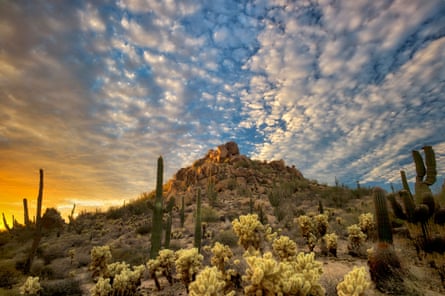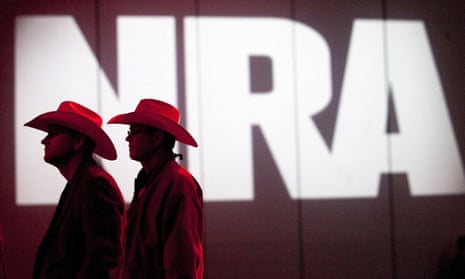In the fall of 2017, a National Rifle Association lobbyist named Benjamin Cassidy left his job at the influential gun group. His next stop: a top position at the US interior department, which oversees hundreds of millions of acres of federal land across the country.
Once in office, it didn’t take Cassidy long to use his new government gig to provide his longtime NRA colleagues with special access to the powerful federal agency, as revealed by previously unreleased communications obtained by the Guardian.
The messages underscore the potent influence that industry lobbyists and conservative organizations enjoy at a government agency where many key leaders are former lobbyists and conservative activists themselves. The NRA has made the most of this dynamic during the Trump presidency, leveraging its connections to shape policy outcomes and personnel decisions at the interior department.
In 2017, for instance, Susan LaPierre, a prominent NRA member and the wife of NRA leader Wayne LaPierre, was appointed by the head of the interior department to the board of the National Parks Foundation, a congressionally chartered organization that supports park programs.
The interior secretary, David Bernhardt, has also made multiple appearances on NRA media channels in recent years, and in June he announced a proposal to open more than 1.4m acres of national wildlife refuge land to hunting and fishing activities. The NRA celebrated the move, calling it a “proposal supported and encouraged by the NRA”.
Just this week, Bernhardt tweeted that “Respecting our second amendment is fundamental to our constitutional republic. We’re expanding opportunities to enjoy hunting and recreational shooting on our wonderful public lands.”
But Benjamin Cassidy is the official that most embodies the NRA’s influence at the interior department.
Starting in October 2017, and for months afterward, Cassidy served as a key contact for the gun group inside the interior department, helping the NRA translate its priorities into action from his perch at the agency’s external affairs office. The NRA spent roughly $30m helping Donald Trump win the presidency in 2016. With assistance from its former lobbyist, Cassidy, it has since reaped rewards in the realm of federal public land and wildlife policy.
In one instance, emails show, he sought to arrange a sitdown between Bernhardt, then the deputy secretary, and Chris Cox, a top NRA official. (An interior department spokesperson said Bernhardt did not attend any such meeting.)
In another case, he appears to have helped an NRA official join the International Wildlife Conservation Council (IWCC), an advisory body set up by the department to help shape policy regarding “international recreational hunting”. In a December 2017 email, Erica Rhoad, the director of hunting policy at NRA, wrote to Cassidy: “Ben, Attached please find two nominations for the IWCC.”
“Thank you,” Cassidy replied. Rhoad, who was one of the nominees, eventually obtained the position she sought on the IWCC, which was stacked with pro-hunting advocates. The IWCC would go on to promote big-game trophy hunting overseas, a longtime NRA priority. In 2018, conservationists sued to disband the council, and their case is ongoing.
Most significantly, Cassidy was in regular communication with NRA about recreational shooting policy on federal lands. Almost immediately after joining DOI in October 2017, for instance, Cassidy reached out to Susan Recce, director of the NRA’s conservation, wildlife and natural resources program, asking her to weigh in on an interior department plan to limit recreational shooting at the Sonoran Desert national monument in Arizona, a plan the NRA was keenly interested in.
“Hi Susan! Hope you are great!” he wrote in an email.“Do you have a quick moment to hop on the phone and discuss recreational shooting in the sonoran desert? We have a [deadline] that is due today.”

Target shooting in the Sonoran Desert national monument in Arizona is controversial – it has damaged archeological artifacts, destroyed saguaro cacti, and harmed other natural and cultural resources.
Recce replied with an NRA plan to leave more of the monument open to target shooting.
In the weeks that followed, Cassidy kept Recce updated on the progress of that target-shooting plan and others, including a proposal to restrict target shooting on public lands in Utah, which the NRA opposed.
In the case of the Sonoran Desert national monument, the NRA got what it wanted. In March 2018, the department signed its final plan, which aligned almost perfectly with the NRA’s request, leaving roughly 90% of the monument open to recreational shooting.
Susan Recce thanked Cassidy for his help in a note that testifies to their close ties.“I appreciate you riding herd over the agency plans affecting recreational shooting,” she wrote to him in a January 2018 email, using a cowboy term to describe his role taking the lead on target shooting issues.
In August 2019, the Wilderness Society, the Sierra Club and other conservation groups sued the interior department over the issue, and their lawsuit is working its way through the courts.
Under federal ethics guidelines, government employees are prohibited from giving “preferential treatment to any private organization or individual”.
“The fact that the Trump administration considered an anti-environment lobbyist like Ben Cassidy qualified to oversee our public lands speaks volumes about who it values and how it operates,” said congressman Raúl Grijalva, the chairman of the House natural resources committee, in a statement. “Mr Cassidy weakened endangered species rules, lobbied against the Antiquities Act from inside the government, almost certainly violated his ethics pledge, and generally treated public service as a chance to dispense political favors to his friends.”Cassidy himself became uncomfortable with his ongoing relationship with the NRA. In an October 2018 email to an NRA staffer, he informed the gun group that he could no longer work directly with it.
“Unfortunately, due to the ethics ban, I am unable to work with the NRA on issues for one more year,” he wrote. He suggested the NRA get in touch with other officials at the department instead.
But it was too late. In April 2019, the interior department’s inspector general opened an investigation into allegations that Cassidy’s conduct had violated federal ethics rules, including the White House’s own ethics pledge. That investigation is currently active.
Not long afterward, Cassidy quietly stepped down from his post. In July 2019, he took a new job: director of government affairs at Safari Club International, a powerful national organization that promotes trophy hunting in the United States and overseas.
In a statement, the interior department said it “will not comment on Mr Cassidy’s motives or reasoning on leaving the department”. Neither the NRA nor Cassidy’s new employer responded to a request for comment.
